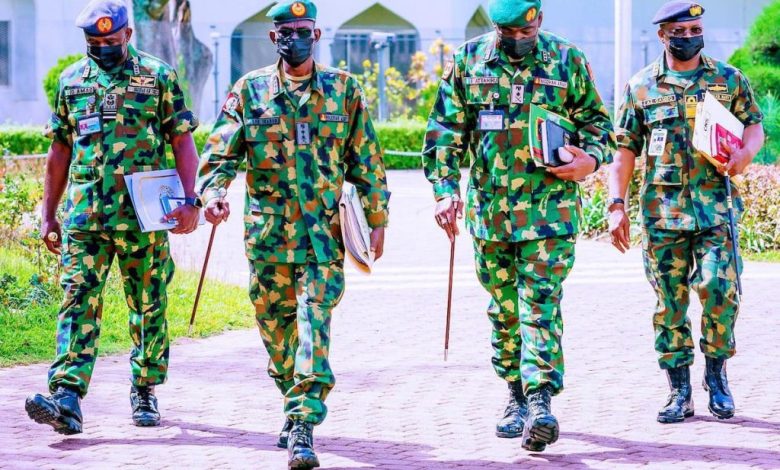
Retiring Chief of Defence Staff and service chiefs in Nigeria will be granted certain benefits upon retirement.
POLITICS NIGERIA reports that these benefits, outlined in a confidential document known as the Terms and Conditions of Service for Officers of the Nigerian Armed Forces, include bulletproof vehicles, personal assistants, guards, and generous medical allowances both in Nigeria and abroad.
Among the retirees set to receive these benefits are General Lucky Irabor, the former Chief of Defence Staff, along with other military leaders such as Lieutenant General Faruk Yahaya, Vice Admiral Awwal Gambo, and Air Marshal Isiaka Amao.
According to Section 11.8 of the revised HTACOS 2017 (a revision of the HTACOS 2012), the retirement benefits for the Chief of Defence Staff and service chiefs encompass several privileges. These include a bulletproof SUV or an equivalent vehicle, to be maintained and replaced every four years by the military service. Additionally, they will receive a Peugeot 508 or equivalent backup vehicle, along with five domestic aides consisting of two service cooks, two stewards, and a civilian gardener.
Furthermore, each retiree is entitled to an Aide-de-Camp or security officer, a special assistant of lieutenant/captain rank or equivalent, or a personal assistant of warrant officer rank or equivalent. Additionally, they will have nine soldiers serving as standard guards.
In terms of transportation, the former Chief of Defence Staff and service chiefs will have access to three service drivers and one service orderly. They will also be provided with escorts by appropriate military units or formations when required. Furthermore, the retirement benefits include free medical coverage within Nigeria and abroad.
Retirees will have the privilege of retaining their military uniforms and accoutrements for ceremonial purposes, as well as personal firearms. However, it should be noted that such firearms will be reclaimed by the relevant services upon the beneficiaries’ demise.
Section 11.19 of the HTACOS 2017 specifies the retirement benefits for Lieutenant Generals in the Nigerian Army, Vice Admirals in the Navy, and Air Marshals in the Air Force. These benefits include two Peugeot 508 cars or one Toyota Land Cruiser, two cooks, two stewards, four residential guards, one service orderly, two service drivers, and free medical treatment in Nigeria and abroad, amounting to $20,000 per year.
For Major Generals in the Army, Rear Admirals in the Navy, and Air Vice Marshals in the Air Force, who hold the rank of two-star officers, retirement benefits consist of one Peugeot 508, a cook, a steward, two residential guards, one service orderly, one service driver, and free medical coverage within Nigeria and abroad, up to $15,000 annually.
Brigadier Generals, Commodores, and Air Commodores, who are one-star officers, will be entitled to one Peugeot 408, a service driver, two residential guards, one service orderly, and free medical coverage in Nigeria and abroad, totaling $10,000 each.
As for Colonels, Captains, and Group Captains in the Army, Navy, and Air Force, respectively, their retirement benefits include a Peugeot 301 or a vehicle of similar value, as well as free medical coverage within the country.
It’s worth noting that the document underwent a review in 2022 after a five-year period. However, it remains unsigned due to concerns regarding unequal distribution of benefits. In order for the revised terms to take effect, the Chief of Defence Staff requires permission from the President to sign the document.
The current HTACOS, which is in effect, specifies that the Chief of Defence Staff and service chiefs must hold the rank of four-star Generals and serve in these positions for a continuous period of two years. The Commander-in-Chief has the authority to extend these appointments for an additional two-year term following the initial expiration.
Despite the detailed provisions outlined, the duration of the Chief of Defence Staff and service chiefs’ tenure ultimately rests at the discretion of the President. This has raised concerns about potential unfair extensions, as was the case under the previous administration when President Muhammadu Buhari extended the tenure of service chiefs appointed in 2015 until their replacement in January 2021.
